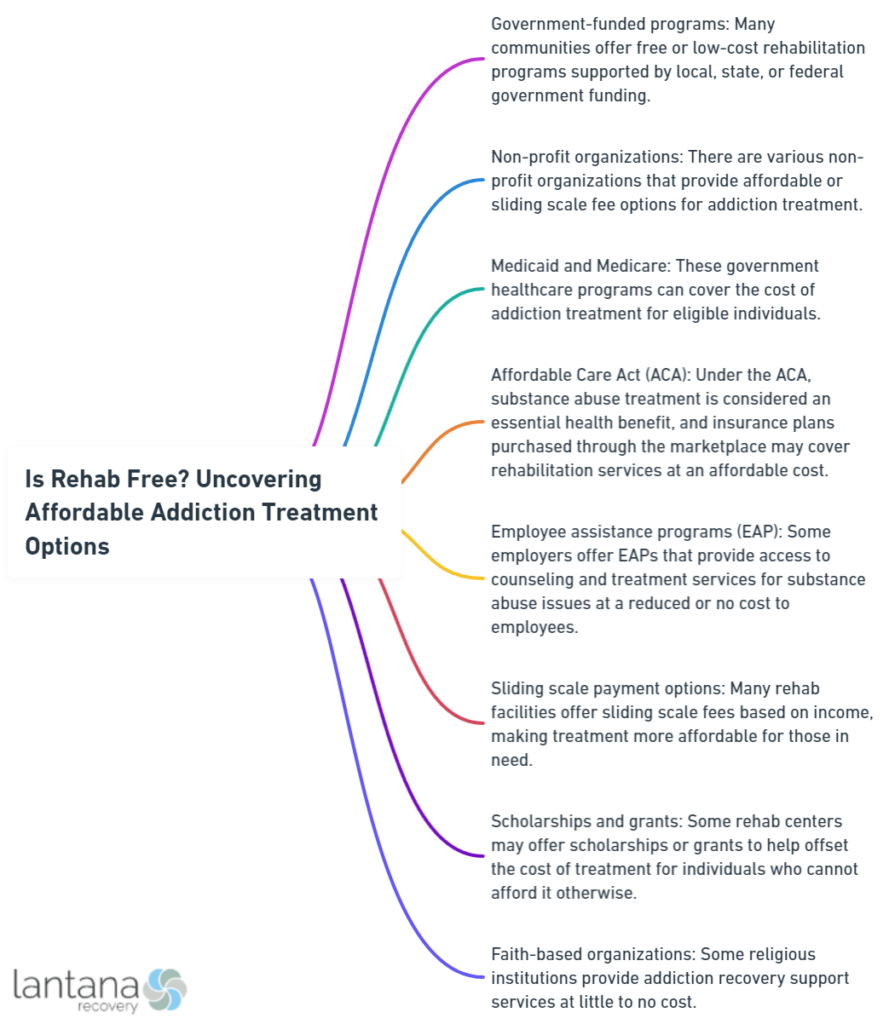Is rehab free? Yes, many individuals can access no-cost addiction treatment, and this guide can show you how. We dive into free rehab services, how to qualify, and what these programs include. Start your journey to recovery with the right information, understanding all the options available to help manage addiction, at no cost to you.
Key Takeaways
- Free rehabilitation centers do exist, funded by government and private sources, offering a range of services from detox to aftercare. However, individuals seeking these services must provide proof of need and meet certain eligibility criteria.
- Resources like SAMHSA’s helpline and online search tool, as well as state-funded programs, provide avenues for finding free addiction treatment. Medicaid and private insurance can also help cover costs, with the Affordable Care Act mandating coverage for addiction treatment.
- For those unable to access free programs, alternatives include sliding fee scales, payment plans, scholarships, and grants. Quality of rehab programs can be gauged by accreditations from CARF or the Joint Commission, state licensure, and the presence of evidence-based treatments.
Exploring the Reality of No-Cost Rehabilitation

Indeed, free rehab centers do exist, offering a lifeline to individuals battling addiction through essential treatment services. The catch is, their availability may depend on individual needs, circumstances, and location. Funded by government, private donors, or other organizations, these centers offer a bevy of services, including:
- Detoxification
- Individual therapy
- Group therapy
- Aftercare planning
The treatment options are vast, ranging from intensive inpatient care to outpatient medical maintenance.
However, please bear in mind that these services aren’t disseminated with the same ease as free supermarket samples. Individuals seeking free rehab services need to verify their income, insurance status, and any requirements for financial support before enrolling.
The Truth About Free Drug Rehab Centers
Free drug rehab centers are not a figment of imagination, but real-life aids for those in the throes of addiction. These centers are funded by government grants and supported by non-profit organizations and community donations. Such centers offer a range of services, akin to paid centers, such as detox, therapy, and aftercare.
Faith-based rehab programs, often part of non-profit initiatives, offer free services that include spiritual guidance as an element of treatment. Specific examples include free drug rehab centers in Texas with state-financed options and programs in California that provide inpatient treatment, detox, and outpatient services.

Understanding Free Substance Abuse Treatment
Free substance abuse treatment programs offer a lifeline to those battling addiction, providing a range of services from intensive inpatient care to outpatient medical maintenance. However, to qualify for such programs, clients generally need to provide the following documentation:
- Proof of state residence
- Lack of income and insurance
- Legal US residence
- Documentation affirming their addiction status
These programs don’t end with detox or therapy. They also provide support services such as 12-step program meetings, counseling, and peer support groups to aid recovery both during and after treatment. These programs are often integrated within public or community health networks, making them accessible through state or local mental/behavioral health or substance abuse services.
Alcohol Rehab South Carolina
If you’re seeking alcohol rehab in South Carolina, there are numerous options available to help you or your loved one overcome addiction. South Carolina offers a range of rehabilitation facilities, from inpatient treatment centers to outpatient programs, tailored to individuals’ needs. These facilities often provide a combination of therapy, counseling, support groups, and medical assistance to guide individuals through the recovery process. Additionally, many alcohol rehab programs in South Carolina focus not only on addressing the addiction but also on addressing underlying mental health issues that may contribute to substance abuse. It’s crucial to research and choose a rehab center that aligns with your specific requirements and offers evidence-based treatments for the best chance of long-term recovery.
Identifying Your Options for Free Addiction Treatment

So, what’s the secret to finding these hard-to-find free rehab programs? Resources such as the Substance Abuse and Mental Health Services Administration’s (SAMHSA) online search tool and helpline are designed to aid this quest. Keep in mind, a key to finding these programs often lies in reaching out to local or state behavioral health services, as free addiction treatment programs are commonly part of public or community health networks.
Aside from being a great resource for locating free rehab programs, SAMHSA’s helpline also provides confidential access to free treatment referrals and information services for substance abuse issues, available 24/7 in English and Spanish. And if you’re wondering how to use insurance, including Medicaid, for free addiction treatment, SAMHSA has got you covered with a guide that answers common behavioral health questions.
Utilizing State-Funded Programs
State-funded free drug rehab programs serve as a ray of hope for uninsured individuals or those without income. They are offered through public mental health or substance abuse treatment centers. To qualify, individuals need to provide:
- Proof of state residence
- Lack of income and insurance
- Legal residence in the US
- Demonstrate a need for addiction intervention.
Access to state-funded programs can be achieved by reaching out to state or local mental/behavioral health or substance abuse services and through resources such as the mental health services administration (SAMHSA) Directory of Single State Agencies. Moreover, federal support like the SAMHSA Substance Abuse Prevention and Treatment Block Grant augment state funding, with priority given to certain groups like pregnant women and intravenous drug users.
Navigating Medicaid and Health Insurance for Free Treatment
Significant contributions from federal programs such as Medicare, Medicaid, and the Affordable Care Act make it possible to provide free or reduced-cost care to those who qualify. While Medicaid coverage varies by state, it generally covers some costs of rehabilitation in drug and alcohol rehab centers, although individuals may be responsible for copayments.
The Affordable Care Act mandates that many private insurance plans cover the costs of addiction treatment. This helps individuals access necessary support and care for their recovery. This includes specialized coverage requirements such as for addiction rehab during pregnancy. To qualify for Medi-Cal, California’s Medicaid program, an individual’s income must be at or below 138% of the poverty level, a common eligibility criterion for Medicaid across various states.
Can You Drink Alcohol on Antibiotics
The question of “can you drink alcohol on antibiotics” is a common one, and the answer depends on the specific antibiotic being taken. Generally, it’s not recommended to consume alcohol while on antibiotics. Alcohol can interfere with the effectiveness of certain antibiotics and may worsen side effects such as dizziness, nausea, and stomach upset. Moreover, alcohol can strain the liver, which is also responsible for metabolizing antibiotics. Mixing alcohol with antibiotics can also increase the risk of liver damage and other adverse reactions. Therefore, it’s best to err on the side of caution and abstain from alcohol while undergoing antibiotic treatment to ensure the medication’s effectiveness and minimize potential health risks.
Alternative Paths to Affordable Drug and Alcohol Rehab

Despite the availability of free rehab centers, these programs might not be accessible to everyone. However, this doesn’t mean affordable treatment is out of reach. There are alternative paths to explore, such as:
- Sliding fee scales
- Payment plans
- Financial assistance
- Private financing
Even crowdfunding platforms have opened up new possibilities, enabling individuals to raise funds for rehab, drawing on the support of friends, family, and the community.
Sliding Scale Fee Systems in Rehab Facilities
For patients with lower income or those paying out of pocket, a sliding fee scale offered by rehab facilities can be a financial lifesaver. It adjusts the cost of services based on the patient’s income and financial capacity, making healthcare more accessible. To set up a sliding fee scale, rehab facilities determine operating costs, research area fees for services, and calculate minimum income requirements to manage expenses. Federal Poverty Guidelines are used to decide charges based on patient income.
For transparency and fairness, facilities establish a clear policy and application process for the sliding fee scale. This includes requiring documentation for qualification and informing patients about the fee schedule. Regular review and updates of the sliding fee scale ensure it remains fair and consistent, maintaining access for different income levels.
Scholarships and Grants for Treatment Costs
Envision securing a scholarship to finance your journey to sobriety. This is not a far-fetched idea. Rehab facilities and external organizations offer various scholarships to assist with the costs of addiction treatment. Organizations such as non-profits and private institutions often provide full rehab scholarships. For instance, 10,000 Beds has contributed over $1,000,000 in support for substance abuse rehab.
Scholarships for rehab may also be sourced from charitable foundations, federal agencies, and local community groups as part of their community service efforts. To qualify, applicants might need to show evidence of their commitment to recovery, like proof of past treatment attempts or having a solid recovery plan. While partial scholarships cover only a portion of rehab costs, full scholarships provide funding for the entire cost of the treatment program. The process of applying generally involves submitting financial information, personal statements, and details about treatment needs. Resources like GrantWatch.com can help individuals find and apply for scholarships and grants for rehab treatment. However, it’s essential to fully understand the terms and conditions accompanying these scholarships and grants, which may include requirements for treatment completion and engagement in follow-up care.
Decoding the Spectrum of Addiction Treatment Services

Free rehab centers offer a spectrum of treatment services, including drug and alcohol treatment programs such as alcohol and drug rehab:
- Short-term detoxification
- Long-term residential care
- Medication management
- Cognitive-behavioral therapy
- Peer support
Comprehensive free rehab programs provide more than just a single service or treatment plan, making them a multifaceted resource.
The quality of a free treatment program can be assessed by evaluating the presence of evidence-based treatments, mental health support, and the involvement of family in the treatment process.
From Medical Detox to Recovery Support Groups
Free rehab centers offer ongoing care, including:
- Sober living arrangements
- Outpatient support
- Intensive outpatient programs
- Co-occurring disorder care
- Opioid detox
These centers, such as Clinica Sierra Vista in Delano, CA, Amity Foundation in Los Angeles, and American Addiction Centers, provide free treatment options to assist individuals in maintaining their sobriety.
These centers are not just about detox and therapy. Controlled environments promote safety and recovery, and experienced staff provide quality care through evidence-based behavioral therapies.
The journey towards sobriety from drug or alcohol addiction is also supported by recovery groups like Alcoholics Anonymous and Narcotics Anonymous, which offer a 12-Step approach and are generally available for free as part of continuing care.
Specialized Programs for Diverse Populations
Free rehab programs customise their services and support to meet the unique needs of different populations. For instance, rehab programs for pregnant women encompass:
- Detox
- Comprehensive addiction treatment
- Medication-assisted treatment
- 24/7 supervision in hospital-based programs
- Continuing recovery in sober living homes
- Additional services such as prenatal care and job training.
Rehab centers, including those in the VA system, offer detoxification, rehabilitation, and psychiatric care tailored to the needs of veterans. Nonprofit organizations and initiatives like The Amy Winehouse Foundation and Gearing Up operate free rehab centers with specialized programs for disadvantaged populations such as young women and women facing multiple challenges.
Is Addiction a Disease
The question of whether addiction is a disease has been a subject of considerable debate and scrutiny within the medical and scientific communities. Proponents of the disease model argue that addiction meets the criteria of a disease due to its chronic nature, biological basis, and the presence of characteristic symptoms. For instance, addiction often involves changes in brain chemistry and functioning, akin to other recognized medical conditions. Furthermore, individuals grappling with addiction typically experience compulsive behaviors and a loss of control over substance use, mirroring the symptomatology of many diseases. However, critics of the disease model contend that addiction is more complex than a straightforward medical condition, emphasizing the psychological, social, and environmental factors that contribute to its development and maintenance. Despite the ongoing discourse, acknowledging addiction as a disease has significant implications for destigmatizing individuals struggling with substance use disorders and promoting access to comprehensive treatment and support services.
Evaluating the Quality of Free Rehab Programs

Accreditations from reputed organizations like the Commission on Accreditation of Rehabilitation Facilities (CARF) and the Joint Commission serve as important indicators of a rehab program’s quality. Non-accredited addiction treatment facilities may legally operate but lack official recognition of meeting certain international quality standards. Accredited facilities undergo rigorous evaluations against industry standards and best practices, including onsite visits and management and treatment outcome audits. Staff at accredited programs must meet specific educational and training requirements, ensuring expertise in delivering addiction treatment and mental health services. These programs also prioritize continuous quality improvement activities, showing their commitment to improve patient care and outcomes.
State licensure and certification ensure that a rehab program meets basic quality and safety requirements. High-quality free rehab programs use evidence-based interventions and are regularly re-evaluated to maintain their accredited status.
Summary
In conclusion, free and affordable rehab options are not mere figments of imagination but real, viable solutions for those grappling with addiction. While availability may depend on individual circumstances and locations, various resources can help locate these centers. Whether it’s a state-funded program, a faith-based initiative, or a rehab center offering a sliding fee scale, there’s help available. Remember, the quality of a rehab program matters, and accreditation by recognized bodies ensures that the treatment you receive meets international standards. The journey towards sobriety may be daunting, but with these resources, it’s a journey you don’t have to make alone.
Frequently Asked Questions
What is the meaning of rehab center?
A rehab center is a facility that offers therapy and training for rehabilitation, including physical, occupational, and speech therapy, with some facilities providing specialized treatments.
Do free rehab centers really exist?
Yes, free rehab centers do exist and are funded by government, private donors, or other organizations, but their availability may vary based on individual needs, circumstances, and location.
What services do free drug rehab centers offer?
Free drug rehab centers offer a range of services including detox, therapy, aftercare, 12-step program meetings, counseling, and peer support groups, similar to paid centers.
Are there alternatives to free rehab centers?
Yes, alternatives to free rehab centers include sliding fee scales, payment plans, financial assistance, private financing, and crowdfunding platforms, as well as scholarships and grants offered by rehab facilities and external organizations to assist with the costs of addiction treatment.









